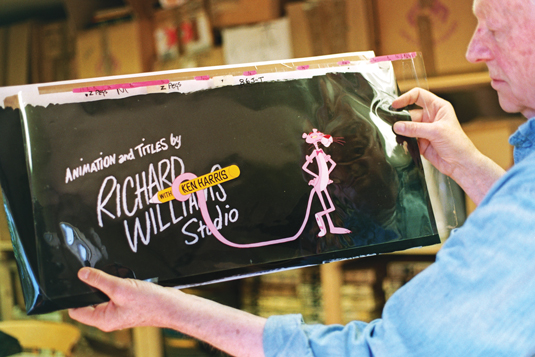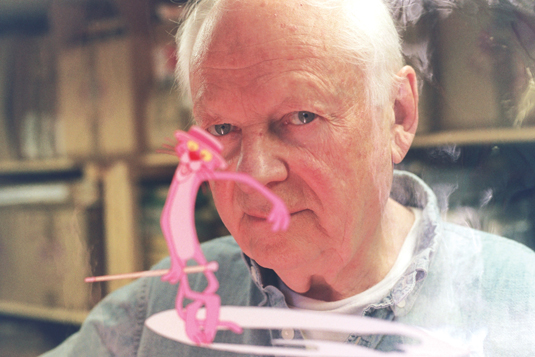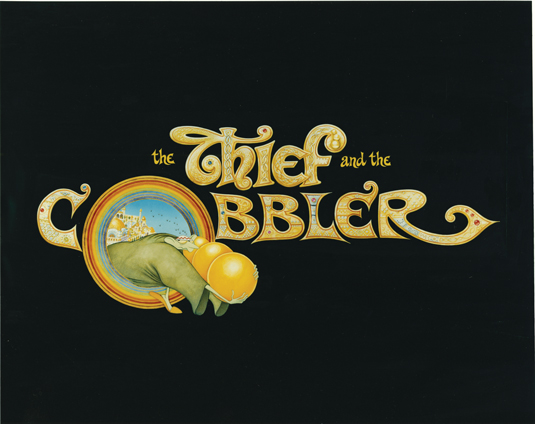How Who Framed Roger Rabbit became an animation game-changer
Legendary animator Richard Williams discusses his spectacular career and how his latest project is his best work so far.
Daily design news, reviews, how-tos and more, as picked by the editors.
You are now subscribed
Your newsletter sign-up was successful
Want to add more newsletters?

Five times a week
CreativeBloq
Your daily dose of creative inspiration: unmissable art, design and tech news, reviews, expert commentary and buying advice.

Once a week
By Design
The design newsletter from Creative Bloq, bringing you the latest news and inspiration from the worlds of graphic design, branding, typography and more.

Once a week
State of the Art
Our digital art newsletter is your go-to source for the latest news, trends, and inspiration from the worlds of art, illustration, 3D modelling, game design, animation, and beyond.

Seasonal (around events)
Brand Impact Awards
Make an impression. Sign up to learn more about this prestigious award scheme, which celebrates the best of branding.

With over 50 years' experience at the highest levels in the industry, veteran animator Richard Williams is best known for his animation direction on Disney/Amblin's Who Framed Roger Rabbit, a film that pushed traditional animation into the modern era. Understanding the concept of a perfect pratfall and the technology to mix digital and traditional techniques seamlessly, Williams - and the rabbit - made history.
Leading to that moment and beyond was his desire to embrace all aspects of animation, to learn from the originators, push new skills and chronicle the artform. A passion for art and years spent working with legends at Warner and Disney meant Williams was always in the position to enhance his skills and develop our thinking of animation. His love of pushing boundaries can be seen in his early work, on the title sequence of Casino Royal and The Return of the Pink Panther.

Early influences
When it comes to the people who influenced his work most, Williams says that there are three main names. "First is Ken Harris, the great Warner Bros animator who showed me by example how much I still had to learn.
Next came Art Babbitt, who I worked with for 14 years. He was a gifted teacher who systematised the knowledge from the 'Golden Years' of animation. Thirdly, the ultimate master animator Milt Kahl; although we were never able to work together, he helped me in numerous ways."
For an animator like Williams, the craft is simple and timeless, lessons learned in traditional animation are as important now as they ever were. "We are all movement mechanics, but our knowledge is only there to enable us to give the performance," says Richard. "Some of us use a pencil, some of us use a mouse. As Shakespeare said: 'The play's the thing.'"

Whether creating cutting-edge CG or shadow puppets in After Effects, the skills needed to bring lines and shapes to life are the same. "I still start with a pencil and paper, so that hasn't changed. But I use all the new technology that helps me... I am now filming digitally instead of using film."
For Williams his inspiration came from seeing Snow White as a five year-old. "My mother said I was never the same again," he says. "I always knew I was some sort of artist, and early on was fascinated by the fact that drawings could walk and talk. I have been drawing since I was two, and I've never stopped."
Daily design news, reviews, how-tos and more, as picked by the editors.
The Rabbit changed everything
Williams' experience and desire to push the boundaries of animation, both artistically and technologically, led him to take the animation director role on Who Framed Roger Rabbit.
He began making the opening sequence on his own, before pulling in other animators such as Simon Wells and Roy Naisbitt - "[Roy] is an expert at pans and stuff like that," he explains.
This Tex Avery-inspired sequence, a fourth wall-tearing moment where the 2D Baby Herman walks off the animation stage, lights a cigar and steps into the 'real world' set a new standard for animation and VFX.
"There was an air of confidence from the very beginning because everybody involved sensed it would be a hit. It was such a novel idea and we knew we had the formula to mix live action and animation in a more convincing way than previously," says Williams. "We needed a cartoon on the front to set up the idea of the film.
I knew Who Framed Roger Rabbit was a game-changer and would have a lot of influence
"When I was animating the scene where Roger Rabbit is in the fridge, Baby Herman is throwing a fit and the live-action director is furious with Roger, I knew we had something. When this transition to live action worked I knew it was a game-changer and would have a lot of influence."
Then and now
No stranger to the short form too, Williams also directed the Oscar-winning A Christmas Carol, The Little Island, A Lecture on Man and Love Me, Love Me, Love Me.
A visit to the Klik! Festival in Amsterdam in November revealed a bustling array of new and exciting short animations in all forms and styles, many of which share Williams’s sense of style and humour, and that of his friend Chuck Jones. Highlights included the standout short Caminandes: Gran Dillama by Pablo Vazquez, Beorn Leonard and Francesco Siddi at the Blender Institute.
A fun challenge that turned into a polished short within a few weeks, Caminandes has since grown into a crowdfunded second short released through the Blender Foundation Open Movie Project. Three more artists joined the original team: Hjalti Hjalmarsson (animation), Andy Goralczyk (lighting and rendering) and Juan Pablo Bouza (rigging); with Sergey Sharybin supporting the team as technical director.
Another standout from the studio Job, Joris & Marieke is Mute, a short about a world populated by people without a mouths. It captures the manic moments of Tex Avery and Williams's contemporaries, proving that great animation tropes are still relevant.
"A gory accident leads to the discovery that cutting yourself can create a mouth. This unleashes an enthusiastic chain reaction among the population," says studio co-founder Job Roggeveen. "We think people like the film because the concept is absurd and gruesome, but the execution is funny and maybe even cute."
It's animators like the ones behind Caminandes 2 and Mute that Williams is now focused on. Not content to rest on his considerable laurels, Richard is keen to share his knowledge to with new animators. "The reason for writing The Animator's Survival Kit was to help other animators," Williams says about his book.
"I was very moved by the great animator Ollie Johnston when he said 'I wish I'd had a book like this when I was starting out'. Acting, movement and film craft are all lifetime studies."
One piece of advice Williams offers is to embrace the craft: "We are actors, slow-motion actors giving the performance. If the character is talking then we are only giving half of the performance - the other half is by the actor doing the voice - but our part is a lot more work!"
Still learning
Richard's work is as relevant today as ever before. At the age of 80 he has a new animation in development, with the working title Will I Live to Finish This? The title is a testament to the animator’s sense of humour. "It's the best work I've done so far," he says. "I ran 25 seconds of it at the Academy of Motion Picture Arts and Sciences recently and heard 1,000 people gasp. So that's very encouraging."
So what's the secret to success? "Because it's a lot of work you need to enjoy the process of doing it; I've always got a thrill from seeing something I've done spring to life," Williams concludes.
This article originally appeared in 3D World issue 179.

The Creative Bloq team is made up of a group of art and design enthusiasts, and has changed and evolved since Creative Bloq began back in 2012. The current website team consists of eight full-time members of staff: Editor Georgia Coggan, Deputy Editor Rosie Hilder, Ecommerce Editor Beren Neale, Senior News Editor Daniel Piper, Editor, Digital Art and 3D Ian Dean, Tech Reviews Editor Erlingur Einarsson, Ecommerce Writer Beth Nicholls and Staff Writer Natalie Fear, as well as a roster of freelancers from around the world. The ImagineFX magazine team also pitch in, ensuring that content from leading digital art publication ImagineFX is represented on Creative Bloq.

